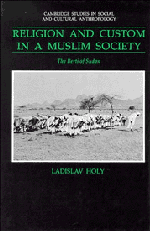Book contents
- Frontmatter
- Contents
- List of illustrations
- Preface and acknowledgements
- Introduction
- 1 The Berti and Islam
- 2 Men and women
- 3 Milk and water
- 4 Village and wilderness
- 5 Custom and religion
- 6 Life cycle
- 7 Circumcision
- 8 Blood and rain
- 9 Custom and superstition
- Glossary
- References
- Index
- Cambridge Studies in Social and Cultural Anthropology
9 - Custom and superstition
Published online by Cambridge University Press: 27 August 2009
- Frontmatter
- Contents
- List of illustrations
- Preface and acknowledgements
- Introduction
- 1 The Berti and Islam
- 2 Men and women
- 3 Milk and water
- 4 Village and wilderness
- 5 Custom and religion
- 6 Life cycle
- 7 Circumcision
- 8 Blood and rain
- 9 Custom and superstition
- Glossary
- References
- Index
- Cambridge Studies in Social and Cultural Anthropology
Summary
The major assumption which underlies much of the anthropological analysis of culture is that culture is first of all a cognitive device. On analysis, it is not seen as practically but as cognitively functional. If it is seen as an instrumental device at all, it is seen as such, not for achieving practical goals, but for imposing meaning on experience and for expressing that meaning.
In the past three decades or so, this concern with meaning has generated a number of influential studies and ideas. It has not, however, generated a unified methodological approach to the study of cultural forms, perceived as symbolic forms, and their meaning. There exists a wide range of approaches to the study of culture in anthropology. These can probably best be sorted out in terms of the respective models used to conceptualise culture.
It was undoubtedly language which provided the most influential model for the analysis of culture. This model was seized upon by structuralists, who have employed a methodology developed in linguistics, and who carry out the analysis of culture in taxonomic terms. In their view, culture can be seen to operate as a linguistic system and, in consequence, they see meaning as resulting from relations between signs and not as being placed by ourselves on and through the objects and acts we see and experience (Parkin 1982: xiii).
- Type
- Chapter
- Information
- Religion and Custom in a Muslim SocietyThe Berti of Sudan, pp. 202 - 221Publisher: Cambridge University PressPrint publication year: 1991



